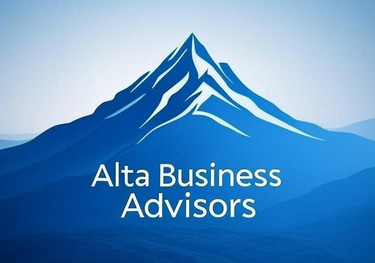Business broker for HVAC, Plumbing & Electrical — Free Calculator | $500 Valuation | Book Call | Call (801) 554-1050
How Value Your Business and Sell Your Business
Thinking of selling your business? Discover how to determine 'How much is my business worth?' with our expert guide at Alta Business Advisors. Learn why Seller’s Discretionary Earnings (SDE), three years of tax returns, year-to-date P&L, and an asset list are key to a professional business valuation. Start your journey to a successful sale today!
Ron Mason
5/29/20254 min read


Understanding the Business Valuation Process: A Guide for Business Owners
If you're considering selling your business or curious about its worth, understanding the business valuation process is essential. At Alta Business Advisors, we specialize in helping business owners answer the question, “How much is my business worth?”
A professional valuation provides clarity for those looking to sell your business, seek investment, or plan for the future. Here’s a detailed look at the key components of a business valuation, including the critical role of adjusted net profit, and why they matter.
Why Business Valuation Matters
A business valuation is more than just a number—it’s a comprehensive assessment of your company’s financial health, market position, and growth potential. For those looking to sell your business, an accurate valuation attracts serious buyers, supports negotiations, and ensures you get the best possible price. Working with an experienced business brokerage like Alta Business Advisors ensures your valuation is credible and aligned with market standards.
The Role of Adjusted Net Profit (Seller’s Discretionary Earnings- SDE)
The foundation of most business valuations, especially for small to medium-sized businesses, is the adjusted net profit, commonly known as Seller’s Discretionary Earnings (SDE). SDE represents the true earning power of your business by adjusting the net profit to reflect the full financial benefit to the owner.
To calculate SDE, we start with the net profit from your tax returns and “add back” certain expenses that are personal or non-operational in nature. These typically include:
Personal Expenses Paid by the Business: Expenses like personal vehicle costs, travel, or memberships that the business covers but aren’t essential to operations.
Owner’s or Officer’s Compensation: Salaries or bonuses paid to the owner or key officers, which may not continue under new ownership.
Amortization and Depreciation: Non-cash expenses found on tax returns that reduce taxable income but don’t reflect actual cash outflows.
Interest: Interest payments on business loans, as these may not apply to a new owner with different financing.
By adding these back and recasting to the net profit, SDE provides a clearer picture of the cash flow available to a potential buyer, making it a critical metric for determining how much your business is worth. For example, a business with a reported net profit of $100,000 might have an SDE of $200,000 after adding back $50,000 in personal expenses, $40,000 in owner’s compensation, and $10,000 in depreciation and interest. This higher SDE often forms the basis for applying a market-driven multiplier to estimate your business’s value.
Key Documents Needed for a Business Valuation
To conduct a thorough valuation and accurately calculate SDE, a business broker will request specific financial and operational documents. These provide a clear picture of your business’s performance and assets. Here’s what you’ll need:
Three Years of Tax Returns
Tax returns are essential for calculating SDE, as they contain the net profit, depreciation, amortization, and interest figures needed for adjustments. They also show revenue, expenses, and profitability trends over time, helping brokers assess stability. Consistent financials boost buyer confidence, while discrepancies may need explanation.Year-to-Date Profit and Loss Statement
A year-to-date profit and loss (P&L) statement reflects your business’s current financial health. It shows revenue, expenses, and net income for the current year, providing insight into recent performance. This is crucial for businesses with seasonal fluctuations or recent growth, as it helps project future SDE and overall value.Asset List at Estimated Replacement Value
An asset list details your business’s tangible and intangible assets, such as equipment, inventory, intellectual property, or customer contracts. Valuing these at estimated replacement cost—what it would cost to replace them today—ensures an accurate reflection of their worth. This step is vital for asset-heavy businesses, like manufacturing or retail, and complements the SDE-based valuation. Use our small business financials guide.
The Business Valuation Process
At Alta Business Advisors, we follow a structured process to determine your business’s value, with SDE as a cornerstone:
Financial Analysis and SDE Calculation
Using your tax returns and P&L statements, we analyze revenue trends, profit margins, and cash flow. We calculate SDE by adding back personal expenses, officer’s compensation, amortization, depreciation, and interest to the net profit, providing a true measure of your business’s earning potential.Please review our financial managment guide for tools to manage your business's finances.
Market Comparison
We compare your business to similar companies in your industry that have recently sold, using SDE multiples common in your sector. This market-based approach, often called the “comparable sales method,” ensures your valuation aligns with current market conditions.Asset Valuation
Your asset list is evaluated at replacement value to account for the cost of replicating your business’s operations. This is particularly important for businesses with significant physical assets.
Industry and Economic Factors
We consider external factors like industry trends, economic conditions, and buyer demand. For example, a business in a growing sector may command a higher SDE multiple than one in a declining market.Final Valuation Report
The result is a detailed valuation report that outlines your business’s worth, driven by SDE and supported by market and asset analysis. This report is invaluable when you sell your business, providing transparency to potential buyers.
Why Work with a Business Brokerage?
Calculating SDE and navigating the valuation process without professional help can lead to inaccurate estimates, potentially costing you thousands when you sell your business. A reputable business brokerage like Alta Business Advisors brings expertise, market knowledge, and industry connections to ensure your valuation is thorough, defensible, and optimized to maximize your sale price.
Ready to Find Out How Much Your Business Is Worth?
Whether you’re planning to sell your business soon or exploring your options, a professional business valuation, anchored by an accurate SDE calculation, is the foundation of a successful exit strategy. At Alta Business Advisors, we’re committed to helping you understand your business’s true value and achieve your goals. Contact us today to start the valuation process and take the first step toward a successful sale.
Contact Alta Business Advisors
111 S Main St., # 2200,
Salt Lake City, UT 84111
801-554-1050
© 2025. All rights reserved.
